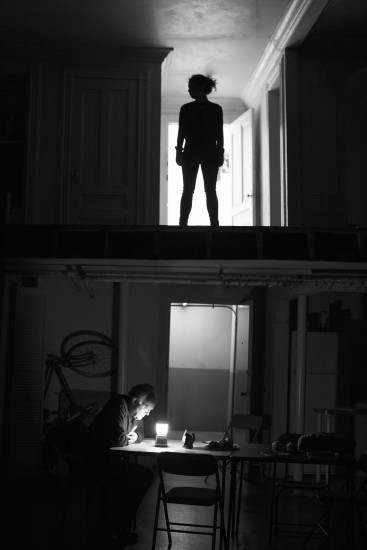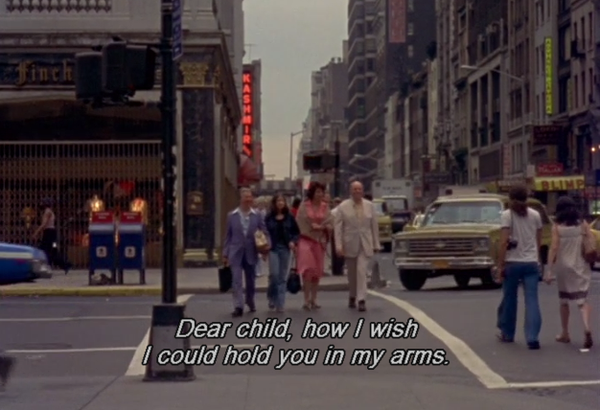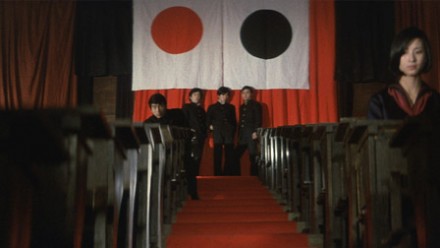
Four high school students select a female target for their fantasies in SING A SONG OF SEX
A TREATISE ON JAPANESE BAWDY SONGS (SING A SONG OF SEX) (NIHON SHUNKAKO) (日本春歌考) (Nagisa Oshima, 1967)
Japan Society
333 East 47th St. at First Ave.
Tuesday, April 19, 7:00
Festival runs through April 23
212-715-1258
www.japansociety.org
 Japan Society’s 2016 Globus Film Series “Japan Sings! The Japanese Musical Film” continues April 19 with a complex, hard-to-define work that is not in any way a traditional musical. But then again, it’s by Nagisa Oshima, who didn’t care much for conventions. In 1967, Oshima, who had previously made such controversial films as Pleasures of the Flesh and Violence at Noon, cowrote (with Takeshi Tamura, Mamoru Sasaki, and Toshio Tajima, although much of the film is improvised) and directed Sing a Song of Sex, the original Japanese title of which translates as A Treatise on Japanese Bawdy Songs. The film opens with red liquid dripping on a red background, as if the Japanese flag is being stained with old and new blood. Hikaru Hayashi’s soundtrack chimes in, combining 1960s mystery and sex comedy themes. On a high school campus, many students are protesting the Vietnam War, but four virgin boys, Nakamura (pop singer Ichiro Araki), Ueda (Kôji Iwabuchi), Hiroi (Kazumi Kushida), and Maruyama (Hiroshi Satô), instead are immersed in sexual fantasies involving raping a politically active student they know only as number 469 (Kazuko Tajima). They go out drinking one night in Tokyo with their professor, Otake (Ichizô Itami), as well as three female students, Kaneda (Hideko Yoshida), Ikeda (Hiroko Masuda), and Satomi (Nobuko Miyamoto), who worship the teacher. Professor Otake gets drunk and sings a low-class shanty that demeans women, a Japanese flag behind him. Later he declares, “Bawdy songs, raunchy songs, erotic songs, songs about sex — these are the suppressed voices of the people. An oppressed people’s labor, their lives . . . and their loves. Once people became conscious of these things, they naturally turned to song to express themselves. That’s why bawdy songs represent the history of the people.” He says that he feels sorry for the youth of Japan, who don’t even know they’re being oppressed. Then another drunk man in the bar explains, “So a doomed people sing the songs of a doomed nation? What’s it matter? Japan’s full of doomed people.” That night Professor Otake dies in his hotel room, leaving the three young women to mourn for him and the four young men to continue his bawdy adventures. Meanwhile, Otake’s lover, Takako Tanigawa (Akiko Koyama), becomes involved in the controversy surrounding his death.
Japan Society’s 2016 Globus Film Series “Japan Sings! The Japanese Musical Film” continues April 19 with a complex, hard-to-define work that is not in any way a traditional musical. But then again, it’s by Nagisa Oshima, who didn’t care much for conventions. In 1967, Oshima, who had previously made such controversial films as Pleasures of the Flesh and Violence at Noon, cowrote (with Takeshi Tamura, Mamoru Sasaki, and Toshio Tajima, although much of the film is improvised) and directed Sing a Song of Sex, the original Japanese title of which translates as A Treatise on Japanese Bawdy Songs. The film opens with red liquid dripping on a red background, as if the Japanese flag is being stained with old and new blood. Hikaru Hayashi’s soundtrack chimes in, combining 1960s mystery and sex comedy themes. On a high school campus, many students are protesting the Vietnam War, but four virgin boys, Nakamura (pop singer Ichiro Araki), Ueda (Kôji Iwabuchi), Hiroi (Kazumi Kushida), and Maruyama (Hiroshi Satô), instead are immersed in sexual fantasies involving raping a politically active student they know only as number 469 (Kazuko Tajima). They go out drinking one night in Tokyo with their professor, Otake (Ichizô Itami), as well as three female students, Kaneda (Hideko Yoshida), Ikeda (Hiroko Masuda), and Satomi (Nobuko Miyamoto), who worship the teacher. Professor Otake gets drunk and sings a low-class shanty that demeans women, a Japanese flag behind him. Later he declares, “Bawdy songs, raunchy songs, erotic songs, songs about sex — these are the suppressed voices of the people. An oppressed people’s labor, their lives . . . and their loves. Once people became conscious of these things, they naturally turned to song to express themselves. That’s why bawdy songs represent the history of the people.” He says that he feels sorry for the youth of Japan, who don’t even know they’re being oppressed. Then another drunk man in the bar explains, “So a doomed people sing the songs of a doomed nation? What’s it matter? Japan’s full of doomed people.” That night Professor Otake dies in his hotel room, leaving the three young women to mourn for him and the four young men to continue his bawdy adventures. Meanwhile, Otake’s lover, Takako Tanigawa (Akiko Koyama), becomes involved in the controversy surrounding his death.
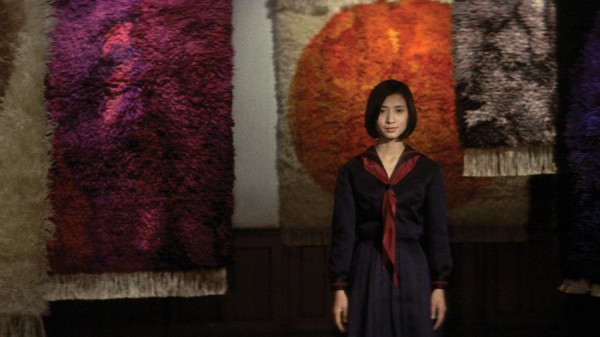
Politics, history, war, sex and death converge in Nagisa Oshima treatise
As with so many Oshima films, Sing a Song of Sex walks a dangerously fine line between sociopolitical commentary and lurid, misogynistic exploitation. The film pits many battles, between men and women, the Japanese flag and the American flag (and ads for Coca-Cola), rich and poor, Japanese and Korean (part of the film takes place on the reinstatement of National Foundation Day, a holiday celebrating the history of Japan that had been banned since the end of WWII), educated and uneducated, bawdy Japanese songs about sex and U.S. protest songs (“We Shall Overcome,” “This Land Is Your Land”), and fantasy versus reality, as it becomes more and more difficult to tell what is really happening and what is just the boys’ teenage imaginings. And the ending is likely to enrage you, but you won’t be able to turn away. Although it uses music to tell its story, it’s hard to consider it a musical; in fact, it’s difficult to classify it at all, other than that it’s another strangely bizarre yet beguiling work from an iconoclastic auteur who always challenges the audience. Sing a Song of Sex is screening at Japan Society on April 19 at 7:00; “Japan Sings! The Japanese Musical Film” concludes April 23 with two contemporary delights, Takashi Miike’s The Happiness of the Katakuris and Tetsuya Nakashima’s Memories of Matsuko.


 Japan Society’s 2016 Globus Film Series “Japan Sings! The Japanese Musical Film” continues April 19 with a complex, hard-to-define work that is not in any way a traditional musical. But then again, it’s by Nagisa Oshima, who didn’t care much for conventions. In 1967, Oshima, who had previously made such controversial films as Pleasures of the Flesh and Violence at Noon, cowrote (with Takeshi Tamura, Mamoru Sasaki, and Toshio Tajima, although much of the film is improvised) and directed Sing a Song of Sex, the original Japanese title of which translates as A Treatise on Japanese Bawdy Songs. The film opens with red liquid dripping on a red background, as if the Japanese flag is being stained with old and new blood. Hikaru Hayashi’s soundtrack chimes in, combining 1960s mystery and sex comedy themes. On a high school campus, many students are protesting the Vietnam War, but four virgin boys, Nakamura (pop singer Ichiro Araki), Ueda (Kôji Iwabuchi), Hiroi (Kazumi Kushida), and Maruyama (Hiroshi Satô), instead are immersed in sexual fantasies involving raping a politically active student they know only as number 469 (Kazuko Tajima). They go out drinking one night in Tokyo with their professor, Otake (Ichizô Itami), as well as three female students, Kaneda (Hideko Yoshida), Ikeda (Hiroko Masuda), and Satomi (Nobuko Miyamoto), who worship the teacher. Professor Otake gets drunk and sings a low-class shanty that demeans women, a Japanese flag behind him. Later he declares, “Bawdy songs, raunchy songs, erotic songs, songs about sex — these are the suppressed voices of the people. An oppressed people’s labor, their lives . . . and their loves. Once people became conscious of these things, they naturally turned to song to express themselves. That’s why bawdy songs represent the history of the people.” He says that he feels sorry for the youth of Japan, who don’t even know they’re being oppressed. Then another drunk man in the bar explains, “So a doomed people sing the songs of a doomed nation? What’s it matter? Japan’s full of doomed people.” That night Professor Otake dies in his hotel room, leaving the three young women to mourn for him and the four young men to continue his bawdy adventures. Meanwhile, Otake’s lover, Takako Tanigawa (Akiko Koyama), becomes involved in the controversy surrounding his death.
Japan Society’s 2016 Globus Film Series “Japan Sings! The Japanese Musical Film” continues April 19 with a complex, hard-to-define work that is not in any way a traditional musical. But then again, it’s by Nagisa Oshima, who didn’t care much for conventions. In 1967, Oshima, who had previously made such controversial films as Pleasures of the Flesh and Violence at Noon, cowrote (with Takeshi Tamura, Mamoru Sasaki, and Toshio Tajima, although much of the film is improvised) and directed Sing a Song of Sex, the original Japanese title of which translates as A Treatise on Japanese Bawdy Songs. The film opens with red liquid dripping on a red background, as if the Japanese flag is being stained with old and new blood. Hikaru Hayashi’s soundtrack chimes in, combining 1960s mystery and sex comedy themes. On a high school campus, many students are protesting the Vietnam War, but four virgin boys, Nakamura (pop singer Ichiro Araki), Ueda (Kôji Iwabuchi), Hiroi (Kazumi Kushida), and Maruyama (Hiroshi Satô), instead are immersed in sexual fantasies involving raping a politically active student they know only as number 469 (Kazuko Tajima). They go out drinking one night in Tokyo with their professor, Otake (Ichizô Itami), as well as three female students, Kaneda (Hideko Yoshida), Ikeda (Hiroko Masuda), and Satomi (Nobuko Miyamoto), who worship the teacher. Professor Otake gets drunk and sings a low-class shanty that demeans women, a Japanese flag behind him. Later he declares, “Bawdy songs, raunchy songs, erotic songs, songs about sex — these are the suppressed voices of the people. An oppressed people’s labor, their lives . . . and their loves. Once people became conscious of these things, they naturally turned to song to express themselves. That’s why bawdy songs represent the history of the people.” He says that he feels sorry for the youth of Japan, who don’t even know they’re being oppressed. Then another drunk man in the bar explains, “So a doomed people sing the songs of a doomed nation? What’s it matter? Japan’s full of doomed people.” That night Professor Otake dies in his hotel room, leaving the three young women to mourn for him and the four young men to continue his bawdy adventures. Meanwhile, Otake’s lover, Takako Tanigawa (Akiko Koyama), becomes involved in the controversy surrounding his death.
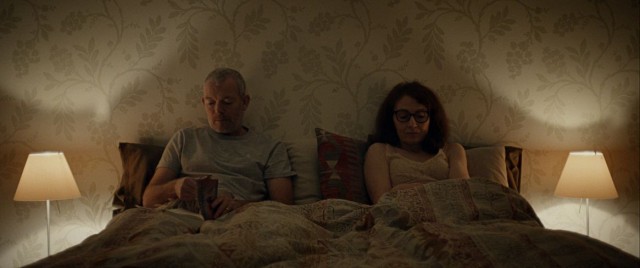

 “When you create a story about yourself that’s based on a lie about who you are and who your family is, sooner or later it’s bound to be revealed,” political journalist Anne Applebaum says at the beginning of Joseph Martin and Sam Blair’s engrossing documentary, Keep Quiet. “Who are we really?” In 2012, Csanád Szegedi was a terrifying young star in Hungary’s far-right Jobbik party, one of the founders of the paramilitary, pro-Nazi, nationalist Hungarian Guard, rising to election to the European Parliament on the strength of a resurgent, virulent anti-Semitism. “I wanted everyone to believe in the world as I saw it,” he says in the film. “Anti-Semitism and discrimination of Jews was a powerful motivation.” But it all came crumbling down when the public heard an audio recording of the young leader’s phone conversation with disgruntled Jobbik party member Zoltán Ambrus, who tells Szegedi that his family is actually Jewish. At first Szegedi refuses to believe it, but soon his maternal grandmother is admitting to him that she is indeed a Holocaust survivor, with a number tattooed on her arm and memories of the camps. Martin (Win a Baby, Scientologists at War) and Blair (Personal Best, Maradona ’86) detail how Szegedi dealt with this dramatic revelation as the conflicted man shares his innermost thoughts, meets with Orthodox Rabbi Boruch Oberlander, and travels to Auschwitz with Holocaust survivor Eva “Bobby” Neumann. He undergoes a radical transformation that not everyone trusts as the film explores who we are, the impact of where we come from, and whether blood trumps all. Keep Quiet is particularly relevant in a world that is experiencing yet another frightening rise in anti-Semitism, especially in Europe. Martin and Blair also delve into Hungary’s history with the Jews, and it’s not a very pleasant one. The film gets to the very heart of the matter, examining the nature of religious hatred in one man who reevaluates everything he believes in when the tables are suddenly turned. Keep Quiet, which features a beautiful score by cellist and composer Philip Sheppard, is screening in the World Documentary Competition at the Tribeca Film Festival on April 18, 19, and 20, with Martin, Blair, Rabbi Oberlander, and Szegedi present on April 18 to discuss the film.
“When you create a story about yourself that’s based on a lie about who you are and who your family is, sooner or later it’s bound to be revealed,” political journalist Anne Applebaum says at the beginning of Joseph Martin and Sam Blair’s engrossing documentary, Keep Quiet. “Who are we really?” In 2012, Csanád Szegedi was a terrifying young star in Hungary’s far-right Jobbik party, one of the founders of the paramilitary, pro-Nazi, nationalist Hungarian Guard, rising to election to the European Parliament on the strength of a resurgent, virulent anti-Semitism. “I wanted everyone to believe in the world as I saw it,” he says in the film. “Anti-Semitism and discrimination of Jews was a powerful motivation.” But it all came crumbling down when the public heard an audio recording of the young leader’s phone conversation with disgruntled Jobbik party member Zoltán Ambrus, who tells Szegedi that his family is actually Jewish. At first Szegedi refuses to believe it, but soon his maternal grandmother is admitting to him that she is indeed a Holocaust survivor, with a number tattooed on her arm and memories of the camps. Martin (Win a Baby, Scientologists at War) and Blair (Personal Best, Maradona ’86) detail how Szegedi dealt with this dramatic revelation as the conflicted man shares his innermost thoughts, meets with Orthodox Rabbi Boruch Oberlander, and travels to Auschwitz with Holocaust survivor Eva “Bobby” Neumann. He undergoes a radical transformation that not everyone trusts as the film explores who we are, the impact of where we come from, and whether blood trumps all. Keep Quiet is particularly relevant in a world that is experiencing yet another frightening rise in anti-Semitism, especially in Europe. Martin and Blair also delve into Hungary’s history with the Jews, and it’s not a very pleasant one. The film gets to the very heart of the matter, examining the nature of religious hatred in one man who reevaluates everything he believes in when the tables are suddenly turned. Keep Quiet, which features a beautiful score by cellist and composer Philip Sheppard, is screening in the World Documentary Competition at the Tribeca Film Festival on April 18, 19, and 20, with Martin, Blair, Rabbi Oberlander, and Szegedi present on April 18 to discuss the film.
